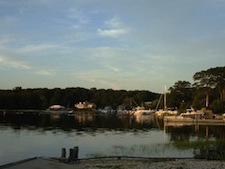
Wednesday, 4 August 1993
‘I WANTED proper American country antiques, I didn’t like faked-up things then. I still don’t,’ says Eliza Werner, the laconic proprietor of Sage Street Antiques.
Her blue eyes peer out coolly from behind tortoiseshell spectacles at the mob frolicking in her shop this steamy Saturday morning, as if it were the beach.
Around 10.15am, like a tribe possessed, the antique seekers begin arriving on Sage Street in Sag Harbor, 45 minutes before Mrs Werner’s opening time. They come on foot, and by car, in Mercs and BMWs, pulling into the lot at the Catholic church opposite. They scuttle into position with nary a glance at the St Vincent de Paul Charity Clothing Drop in the churchyard.
There ensues dialogue you could only hear either waiting for a Woody Allen movie or in one.
‘Do you think there’s anything fresh today?’ asks one woman.
‘Did you see the andirons with the lobsters?’ says a man in pink Bermuda shorts.
‘Are we going to find something here with so many people?’
Sag Harbor produces in people a proprietary frenzy, not least the antique seekers who feel Sage Street is theirs, to plunder at will, every Saturday and Sunday, when it opens for a few hours, as if this were actually a party at Eliza Werner’s house where the kiddies could take home the crockery. Me, I’m after the jam pot with porcelain plums on top.
As the crowd perambulates, Eliza Werner presides equably, her slightly crusty style making you feel she has generations of Sag Harbor salt in her blood. In fact, she arrived less than a quarter century ago from New York City. Still, Sag Harbor was pretty rural back then, and she says ‘I thought: who will I talk to? You had to make a job here or you’d go nuts.’
For years she failed to get the hang of the business. ‘I was very cautious. I’d spend dollars 300 and sell that much. I couldn’t see how you made money. People would say, ‘Don’t you have anything fresh?’ ‘
Sometimes, out of ignorance, she tagged items way below market value. ‘Dealers are always hoping I’ll make a mistake,’ she says. ‘But it can be good advertising.’
Ms Werner spends five days a week fixing, sorting, shopping, mostly on Long Island, although occasionally she heads up to Massachusetts.
She glances around unblinking as shoppers and dealers, in wrinkled shorts and spandex, in sneakers and high-heel cork-sole mules, peer at glass and china, old cookbooks and prints, a dinette set from the Fifties, a pine chair – souvenir of the hurricane of 1938 that washed away much of Long Island, seven yellow plates (‘See how heavy that glaze is]’). Because this is Sag Harbor and Sage Street is an institution, it all has an air of authenticity. Also, there is no air-conditioning.
‘I hear this place is gonna be on TV,’ someone mutters dolefully.
‘Oh, well, then it’s all over for us,’ replies a dour woman in a headband.
The invasion has begun from just over the highway, where New York City’s rich summer in the CashHamptons, as Sag Harbor writer Michael Thomas has dubbed it.
More than sex, or a suntan, summer folk on the East End of Long Island are obsessed with antiques. At weekends, every rustic antique shop seethes with them, like pigs after truffles, in pursuit of that perfect folk art bedspread, the perfect . . . the only word for it all is the Yiddish tchotchke (rhymes with Trotsky).
This part of Long Island was settled in the mid-1600s, so the promise of antiques is as ripe as the corn – much of it more chic than old. Everything sells. On the road once, I saw two dead racoons beside a large bust of William Shakespeare, and for a moment thought they were offerings by some prescient antiquary instead of the detritus of a Saturday night.
But in Sag Harbor? In honest little Sag, just enough off the beaten track to escape any real style and so beloved by inverted snobs, we do not have Laura Ashley or restaurants entitled the Quiet Clam. But even here, in this vigorous little village, its main street blissfully given over largely to drugstores and liquor stores, a dry cleaners and Marty’s Barbershop, there are stores selling many things made of elderly pine.
There is, of course, the necessary balance between making a buck and killing the goose that lays the bucks, so to speak, and if weekend people come to Sag Harbor because it is authentically quaint and not faked- up, they naturally want to take home a little piece of something old.
And so to Sage Street. I have a flashback: Sage Street Antiques, buzzing for a few hours with women wearing Rolexes that weigh more than they do, probably perfectly resembles the original Sag Harbor in its boom years, the 1840s, when it was the Oklahoma of sperm whale oil, a flashy port cruised by rich foreigners.
A woman in a hat inspects a string of beads. Real crystal? Is it amber? Is there a fly embedded in it? Ms Werner shrugs politely.
The shoppers cart away their treasures, taking with them my jam pot] Remaining, however, is a copy of Diana: Her True Story by Andrew Morton. Mint condition.